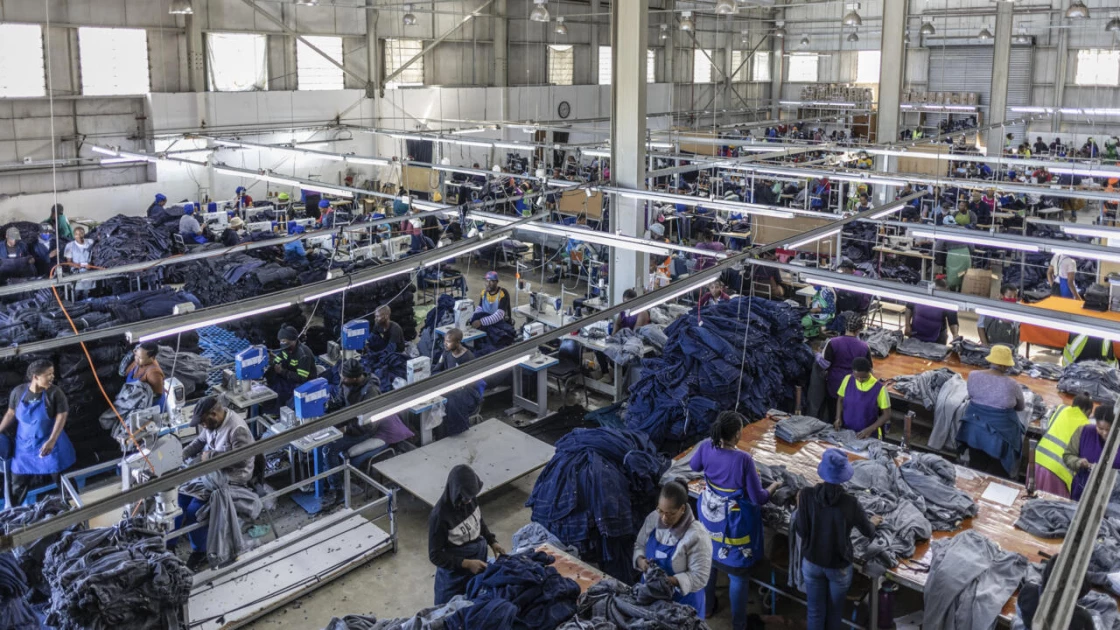Lesotho hardest hit as new US tariffs rattle Africa

Lesotho's clothing industry is the largest employer in the tiny kingdom which fears the impact of new sweeping US tariffs © Roberta Ciuccio / AFP/File
The small African kingdom of Lesotho feared the worst for
its textile industry Thursday after US President Donald Trump imposed
50-percent tariffs on its imports, the highest for a single nation.
Other African countries hit with Trump's "reciprocal
tariffs" above the new baseline rate of 10 percent include Madagascar (47
percent), Mauritius (40 percent), Botswana (37 percent), Equatorial Guinea (30
percent) and South Africa (30 percent).
But the mountain kingdom, which the US administration says
is among "the worst offenders" with high tariffs on US imports, will
be particularly hard hit as it is reliant on exports of mostly textiles,
including jeans.
While its government did not immediately react to the new
tariffs, Lesotho Private Sector Foundation CEO Thabo Qhesi told AFP Thursday
they meant that "the textile and apparel industry is going to die."
The clothing industry is the largest employer in the tiny
kingdom of around 2.3 million people, providing more than 35,000 workers,
according to official data.
"Before the introduction of the reciprocal tariffs,
investors enjoyed exporting goods to the US market duty-free," Qhesi said.
"With the introduction of the 50-percent tariffs,
Lesotho is no longer going to be lucrative for investors," he said, adding
the transport, retail and residential property sectors would also suffer.
At 47 percent, the tariffs are also high for Madagascar,
which said Thursday it had approached the US embassy to "seek
clarification and explore possibilities for adjusting these new tariff
barriers".
The government will "mobilise all diplomatic and
commercial levers to obtain a review of these measures", it said.
South African President Cyril Ramaphosa said Thursday the
tariffs were "a barrier to trade and shared prosperity".
They underscore the urgent need for "a new bilateral
and mutually beneficial trade agreement", he said. The United States is
South Africa's second-largest trading partner.
The country's automotive sector will be among the hardest
hit, with separate tariffs of 25 percent on foreign-made cars going into effect
shortly after Trump's late Wednesday proclamation.
Motor vehicles account for 22 percent of South Africa's exports
to the United States, worth $1.88 billion, according to government statistics.
South African Minister of Trade Parks Tau said the new
global trade war would affect poorer countries most and "literally
devastate" Lesotho.
"We now have to look amongst ourselves and say, within
the customs union in Southern Africa, within the Southern African Development
Community, and within the region of Africa, how we're going to respond to these
issues," he told journalists.
"Diversifying our trade is going to be important...
enhancing our work on the African continent and collaborating," he said.
The new US tariffs will be "disruptive of global value
chains, invite retaliation, ignite inflation, dampen world economic growth and
prompt repricing of risks in financial markets", said South Africa-based
economics professor Raymond Parsons.
South Africa "must see what trade adjustments might be
made to win concessions to ameliorate the situation", Parsons said, adding
Pretoria should "prudently seize the moment" to find alternative
trading partners.
However, "everybody is going to look for new trading partners,"
said South African economist Dawie Roodt. "Of course, we must try. But
it's going to be tough."
Want to send us a story? SMS to 25170 or WhatsApp 0743570000 or Submit on Citizen Digital or email wananchi@royalmedia.co.ke
Comments
No comments yet.


Leave a Comment